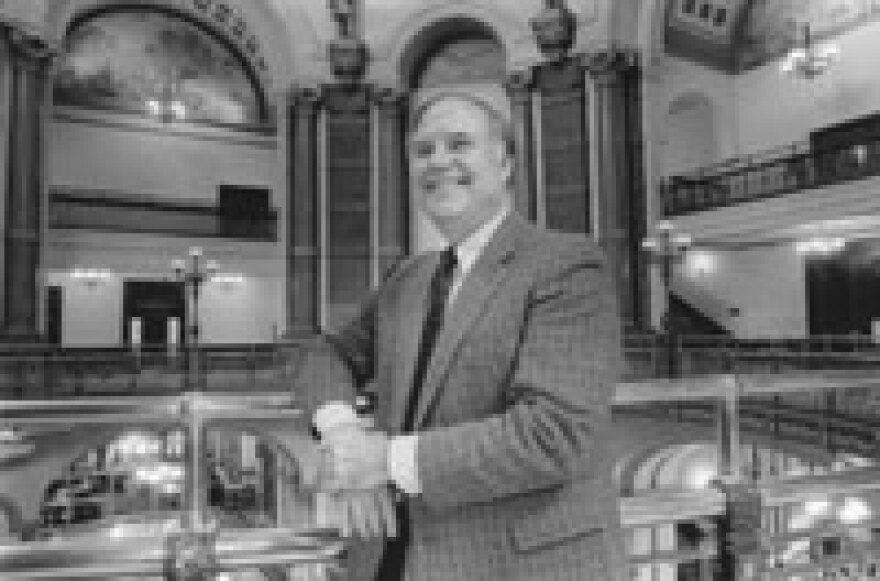As the new year dawns across Illinois, the state and its civic life are much the poorer for the untimely deaths late last year of two of the finest public servants ever to grace our prairies.
Within a month of each other in the waning days of 2003, veteran journalist and educator Bill Miller and former U.S. Sen. Paul Simon passed away.
At first glance, one might not notice the common threads running through the lives of the two men. After all, Bill never held public office, while Paul was elected to state and national posts and ran for the presidency in 1988.
Yet closer inspection reveals that they shared many commonalities, from their modest beginnings as idealistic reporters to the immense, positive impact their careers had on public life in Illinois.
Both exemplified the qualities upon which democratic government rests, such virtues as unquestioned honesty, imperturbable civility, unfailing decency, abiding compassion and a deep commitment to the commonweal.
Both believed strongly in service to others, whether as a journalist helping inform folks about important public policy questions, or as an elected office-holder using the power of government to improve the lives of average citizens.
Both shared a firm conviction that the public’s business should be conducted out in the open, not behind closed doors, so that people could see what their elected leaders and other public officials were up to. Both worked tirelessly to transform the ideal of open government into a reality in Illinois. Both championed governmental ethics before such probity was fashionable.
And, on a more personal note, both were lifelong educators who were instrumental in the birth and subsequent flourishing of the Public Affairs Reporting program at the University of Illinois at Springfield, the educational endeavor that I now have the good fortune to head.
Reflect for a moment, gratefully, on the lives and legacies of these two extraordinary men.
Born Alvin Pistorius in Carlinville, Bill Miller adopted his professional name at the behest of a radio news director who thought “Pistorius” was too much of a tongue-twister for downstate listeners.
A University of Illinois graduate, Bill started at Springfield AM station WTAX in 1949, serving as a reporter and news director until 1967, when he became managing editor of CIB News, a Statehouse radio news service.
At WTAX, Bill gained a reputation as a resourceful reporter who took seriously the media’s obligation to be the public’s watchdog over the conduct of public affairs, earning an Edward R. Murrow Radio Documentary Award in 1967 for his investigation of a crooked furniture deal.
The son of Lutheran missionaries, Paul Simon first gained public attention as the 19-year-old publisher of a weekly newspaper in Troy who crusaded against political corruption and organized crime in Madison County.
First elected to the Illinois House in 1954, he was re-elected three times, before serving six years in the Illinois Senate.
As a reformist, he spoke out courageously against the seamier side of Illinois lawmaking, most notably in a 1964Harper’s magazine article on legislative corruption, which made him a pariah among many of his elected colleagues. Paul also sponsored the state’s Open Meetings Act, which newsman Bill Miller — ever a champion of open government — helped write.
Indeed, Bill also was among the media professionals who helped pen the state’s Freedom of Information Act and was co-founder and charter president of the Illinois Freedom of Information Council. His unflagging passion for the public’s right to know earned him “Illinoisan of the Year” honors in 1989 from the Illinois News Broadcasters Association — which he co-founded — and the Illinois Press Association’s James Craven Freedom of the Press Award in 1998.
Paul, meanwhile, was winning “Best Legislator” awards year after year from the Independent Voters of Illinois, a string broken when Illinoisans in 1968 chose the Democratic Simon as lieutenant governor to Republican Gov. Richard Ogilvie, the only such partisan mismatch in state history.
Despite their partisan differences, the two men developed a professional relationship based on respect and trust. Ironically, their civility was supplanted by mutual distrust and disdain between their successors, though Gov. Dan Walker and Lt. Gov. Neil Hartigan were both Democrats.
Simon’s loss to Walker in the 1972 Democratic gubernatorial primary was a blessing for three-year-old Sangamon State University, whose president, Robert Spencer, invited him to join the university faculty. Working closely with senior members of the Statehouse press corps, they fashioned a graduate program combining academic work with hands-on experience to provide young journalists with a better understanding of government and politics and with enhanced reporting and writing skills to inform the public about government news.
Paul became the PAR program’s first director in 1972, a position he held until resuming his political career as a successful candidate for Congress two years later. Bill was named director in 1974, and under his leadership the fledgling program prospered, attracting talented and motivated students from undergraduate schools across the nation. By the time he retired in 1993, the PAR family numbered hundreds of alums who have gone on to distinguish themselves as professionals, a legacy that has enriched public understanding of government and politics throughout the nation.
Paul Simon and Bill Miller — two remarkable individuals whose lives epitomized public service of the highest order. “All of us would do well to honor his memory by striving to live our lives with his as our model,” said House Speaker Michael Madigan, speaking of Simon. Sound advice, too, in celebration of Bill Miller.
Charles N. Wheeler III is director of the Public Affairs Reporting program at the University of Illinois at Springfield.
Illinois Issues, January 2004






